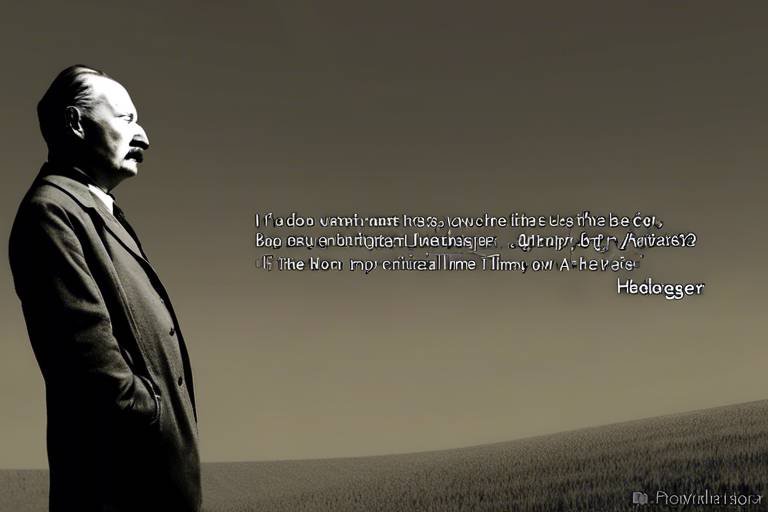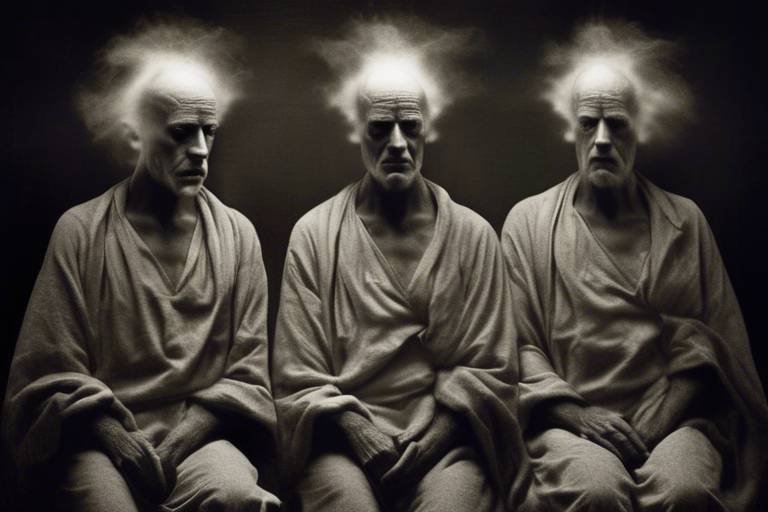The Importance of Philosophy in Literature
Have you ever read a book that made you stop and think, questioning not just the plot but the very essence of existence? This is the beauty of literature intertwined with philosophy. The connection between these two domains is not just a mere coincidence; it is a profound relationship that enhances our understanding of the human experience. Literature serves as a mirror reflecting the complexities of life, while philosophy provides the lens through which we can examine these reflections. Together, they create a rich tapestry of ideas that challenge our perceptions and provoke deep thought.
At its core, literature is a vessel for exploring the big questions of life. It delves into themes such as existence, morality, and knowledge, inviting readers to engage with concepts that have puzzled humanity for centuries. For instance, consider how a novel might explore the ethical implications of a character's choices. Through their journey, readers are encouraged to reflect on their own values and beliefs. This interplay between narrative and philosophical inquiry not only enriches the text but also fosters a deeper connection between the reader and the story.
Moreover, the influence of philosophical thought on literature is immense. Renowned writers often draw inspiration from the great thinkers of their time. Think of how Friedrich Nietzsche's ideas about the "will to power" resonate through the works of authors like Hermann Hesse or how Plato's theory of forms can be seen in the writings of Virginia Woolf. These connections create a dialogue between the past and present, enabling literature to evolve while remaining rooted in philosophical discourse.
In the realm of modern literature, existentialism stands out as a significant philosophical movement that has profoundly shaped narratives. The themes of individual freedom, choice, and the quest for meaning in a chaotic world resonate deeply with readers. Characters often find themselves on a quest for identity, grappling with existential crises that mirror our own struggles. This exploration of the human condition through existential lenses not only captivates readers but also invites them to reflect on their own lives.
As we navigate through literature, we uncover the ethical dilemmas and moral questions that challenge our understanding of right and wrong. Books often serve as platforms for discussing complex issues, prompting readers to examine their own values. For example, a gripping story about a character facing a moral dilemma can lead readers to question what they would do in a similar situation. This reflective process is where the power of philosophy in literature truly shines.
In conclusion, the importance of philosophy in literature cannot be overstated. It enriches our reading experience, provides tools for literary analysis, and encourages us to engage with profound questions about our existence. By understanding the philosophical underpinnings of literary works, we not only enhance our appreciation of the text but also gain insights into the complexities of life itself. So, the next time you pick up a book, remember that you are not just reading a story; you are embarking on a journey through the intricate landscape of human thought and experience.
- How does philosophy enhance literary analysis? Philosophy provides frameworks for understanding themes, character motivations, and ethical dilemmas within literature.
- What are some philosophical themes commonly found in literature? Common themes include existence, morality, knowledge, and the nature of reality.
- Can literature influence philosophical thought? Absolutely! Literature often raises questions that challenge or expand philosophical discourse.
- Who are some key philosophers that have influenced literature? Philosophers like Sartre, Camus, Nietzsche, and Plato have had significant impacts on literary narratives.

Philosophical Themes in Literature
Literature is not just a collection of words strung together; it is a mirror reflecting the complexities of the human experience. Within its pages, we often encounter profound philosophical themes that challenge our perceptions of existence, morality, and knowledge. These themes invite readers to engage deeply with the text, encouraging a dialogue between the author’s ideas and the reader's own beliefs. Have you ever read a book that made you question your understanding of right and wrong? Or perhaps a novel that left you pondering the very essence of life itself? This is the power of philosophy in literature, as it elevates storytelling from mere entertainment to a profound exploration of what it means to be human.
At the heart of many literary works lies the exploration of existential questions. Authors delve into the nature of existence, often asking what it means to be alive in a world that can feel chaotic and indifferent. This existential inquiry compels readers to reflect on their own lives, prompting them to consider their purpose and the choices they make. For instance, in works like Dostoevsky's "Crime and Punishment," the protagonist Raskolnikov grapples with morality and guilt, leading readers to confront their own ethical beliefs. Such narratives serve as a vehicle for examining the moral fabric of society and our place within it.
Another significant theme in literature is the quest for knowledge. Writers often explore the limits of human understanding and the pursuit of truth. This theme resonates with readers who seek to comprehend the complexities of life. In novels like "Fahrenheit 451" by Ray Bradbury, the suppression of knowledge leads to a dystopian society, prompting readers to reflect on the value of intellectual freedom and the dangers of ignorance. Here, literature acts as a cautionary tale, urging us to cherish our capacity for critical thought and inquiry.
Moreover, the exploration of morality often takes center stage in literary works. Authors use their narratives to depict ethical dilemmas that challenge characters and, by extension, readers. Take, for example, the moral quandaries faced by characters in Shakespeare's plays. The decisions made by Hamlet or Macbeth force us to confront our own values and the consequences of our actions. Through these stories, literature becomes a forum for examining the ethical implications of human behavior, pushing us to question what we believe is right or wrong.
In summary, the philosophical themes embedded in literature serve to enrich our understanding of the human condition. By confronting existential questions, exploring the limits of knowledge, and grappling with moral dilemmas, literature invites us into a deeper conversation about life itself. It challenges us to think critically and reflect on our own experiences, ultimately enhancing our appreciation for the intricate tapestry of human existence.

The Influence of Philosophers on Writers
Throughout history, the realms of philosophy and literature have danced a delicate tango, each influencing the other in profound ways. Many renowned writers have drawn inspiration from philosophical thinkers, weaving their ideas into narratives that challenge conventions and provoke thought among readers. It’s fascinating to consider how a single philosophical concept can ripple through a literary work, enriching its themes and enhancing its emotional depth. For instance, the existential musings of philosophers like Friedrich Nietzsche and Søren Kierkegaard have found their way into the fabric of modern literature, offering writers a robust framework to explore the complexities of the human condition.
Writers such as Virginia Woolf and James Joyce have been heavily influenced by philosophical ideas, particularly those surrounding consciousness and perception. Woolf’s stream-of-consciousness narrative style reflects the philosophical inquiries into the nature of reality and subjective experience. Similarly, Joyce’s intricate layering of meaning in works like Ulysses showcases how philosophical concepts can be transformed into literary brilliance. The interplay between these two disciplines not only enriches the narratives but also invites readers to engage with the text on a deeper level.
Moreover, the influence of philosophy extends beyond individual authors. It shapes entire literary movements. Consider the impact of Romanticism, which was deeply entwined with the philosophical ideas of the Enlightenment. Writers like William Wordsworth and Samuel Taylor Coleridge embraced the notion of individualism and the sublime, which were philosophical ideas of their time. Through their poetry, they not only expressed their own emotions but also reflected broader philosophical sentiments about nature, humanity, and existence.
In contemporary literature, the echoes of philosophical thought continue to resonate. Authors like Salman Rushdie and Margaret Atwood often engage with philosophical questions related to identity, power, and ethics. Their works serve as a canvas for exploring the implications of philosophical ideas in modern society. This ongoing dialogue between philosophy and literature highlights the importance of philosophical inquiry in understanding the narratives we consume and the world we inhabit.
| Philosopher | Influenced Writers | Key Concepts |
|---|---|---|
| Friedrich Nietzsche | Hermann Hesse, Albert Camus | Will to Power, Eternal Recurrence |
| Søren Kierkegaard | Franz Kafka, Virginia Woolf | Existentialism, Subjectivity |
| Jean-Paul Sartre | Samuel Beckett, Albert Camus | Existentialism, Freedom |
| Simone de Beauvoir | Margaret Atwood, Virginia Woolf | Feminism, Ethics |
In conclusion, the influence of philosophers on writers is a testament to the enduring power of ideas. As we delve into literary works, we uncover layers of meaning that are often rooted in philosophical thought. This intricate relationship not only enhances our understanding of literature but also enriches our own perspectives on life, morality, and existence. So, the next time you pick up a book, consider the philosophical underpinnings that may be at play, and how they shape the narrative you’re engaging with.
- How do philosophers influence literature?
Philosophers provide frameworks and ideas that writers can explore, allowing them to delve into complex themes such as existence, morality, and identity. - Can literature reflect philosophical ideas?
Absolutely! Literature often serves as a medium to express and explore philosophical concepts, inviting readers to engage with these ideas on a personal level. - What are some examples of philosophical themes in literature?
Common themes include existentialism, ethics, the nature of reality, and the search for meaning, often found in the works of authors influenced by philosophical thought. - Are there specific philosophers that have influenced modern writers?
Yes, philosophers like Nietzsche, Sartre, and Beauvoir have significantly impacted contemporary literature, shaping the narratives and themes explored by modern authors.

Existentialism in Modern Literature
Existentialism has become a cornerstone of modern literature, acting as a lens through which writers explore the complexities of human existence. This philosophical movement, which emphasizes individual freedom and choice, resonates deeply with readers navigating the chaotic landscape of contemporary life. Imagine standing at a crossroads, with various paths stretching before you, each representing a choice that could alter your destiny. This metaphor captures the essence of existential thought, where the weight of decision-making and the quest for meaning are central themes.
In modern literature, existentialist themes manifest in various forms, often through characters who grapple with profound questions about identity and purpose. These characters frequently find themselves in situations that force them to confront their own existence, much like a mirror reflecting their innermost fears and desires. Take, for instance, the works of authors such as Franz Kafka and Virginia Woolf, who delve into the absurdities of life and the struggle for authenticity. Their narratives often leave readers pondering the nature of reality and the significance of personal choices.
One of the most compelling aspects of existentialism in literature is its ability to evoke empathy and self-reflection. When readers encounter characters facing existential crises—like the iconic figure of Meursault in Albert Camus's The Stranger—they are invited to explore their own beliefs and values. Meursault's indifference to societal norms and his confrontation with the absurdity of life challenge readers to question their perceptions of morality and existence. This connection between character and reader creates a powerful emotional experience, making existentialism not just a philosophical concept but a lived reality.
Moreover, existentialism in literature often reflects broader societal issues, such as alienation, despair, and the search for meaning in a world that seems increasingly fragmented. Authors like Jean-Paul Sartre and Simone de Beauvoir have used their narratives to critique social constructs and advocate for personal freedom. Their works serve as a reminder that while life may be chaotic and unpredictable, individuals possess the power to define their own existence. This idea is particularly relevant in today's fast-paced world, where many feel lost in the hustle and bustle of modern life.
As readers immerse themselves in existentialist literature, they are encouraged to engage in critical thinking and introspection. The exploration of existential themes not only enriches the reading experience but also fosters a deeper understanding of the human condition. In a way, these literary works act as philosophical dialogues, prompting discussions around freedom, choice, and the essence of being.
In summary, existentialism has left an indelible mark on modern literature, shaping narratives that challenge conventions and provoke thought. By examining the struggles of characters who confront the absurdity of existence, readers are invited to embark on their own journeys of self-discovery. Through this lens, literature becomes a powerful tool for exploring the complexities of life, encouraging us to embrace our freedom and take ownership of our choices.
- What is existentialism?
Existentialism is a philosophical movement that focuses on individual freedom, choice, and the search for meaning in an often chaotic world. - How does existentialism manifest in literature?
Existentialism appears in literature through characters facing profound questions about identity and purpose, often leading to existential crises. - Who are some key existentialist authors?
Notable existentialist authors include Jean-Paul Sartre, Albert Camus, and Franz Kafka, who explore themes of absurdity and authenticity in their works. - Why is existentialism relevant today?
Existential themes resonate in contemporary society, as many individuals grapple with feelings of alienation and the search for personal meaning in a fast-paced world.

Key Existentialist Authors
This article explores the intricate relationship between philosophy and literature, examining how philosophical concepts enrich literary works and enhance our understanding of human experience.
Literature often reflects profound philosophical themes such as existence, morality, and knowledge, inviting readers to engage with complex ideas that shape human understanding and society.
Many renowned writers have drawn inspiration from philosophical thinkers, integrating their ideas into narratives that challenge conventions and provoke thought among readers.
Existentialist themes prominently feature in modern literature, exploring individual freedom, choice, and the search for meaning in an often chaotic world.
When we talk about existentialism in literature, a few names pop up that have left an indelible mark on the literary landscape. Jean-Paul Sartre is perhaps one of the most significant figures in this realm. His works, such as Nausea and Being and Nothingness, delve deep into the concepts of freedom and responsibility, challenging readers to confront their own existence and the choices they make. Sartre’s philosophy posits that existence precedes essence, meaning that individuals are not defined by predetermined roles but rather by their actions.
Another titan of existential literature is Albert Camus. His famous novel The Stranger presents a protagonist, Meursault, who embodies the absurdity of life—a central theme in Camus' philosophy. Through Meursault's experiences, readers are invited to ponder the arbitrary nature of existence and the search for meaning in a world devoid of inherent purpose. Camus’ notion of the “Absurd Hero” encourages us to embrace our struggles and find personal significance even amidst chaos.
Additionally, we cannot overlook the contributions of Fyodor Dostoevsky, whose works often grapple with moral dilemmas and the complexities of the human psyche. In novels like Crime and Punishment and The Brothers Karamazov, Dostoevsky explores themes of guilt, redemption, and the search for meaning in suffering, which resonate deeply with existential thought. His characters frequently confront profound ethical questions, reflecting the turmoil of their inner lives and the societal constraints they face.
Lastly, Simone de Beauvoir made significant contributions to existentialist literature, particularly in her groundbreaking work The Second Sex. In this text, she examines the construction of female identity and the societal constraints imposed on women, encouraging readers to challenge traditional gender roles and embrace their freedom. De Beauvoir’s existential feminism highlights the importance of individual choice and the necessity of self-definition in a world that often seeks to define us.
These authors, among others, have not only shaped the existentialist movement but have also provided a lens through which we can examine our own lives. Their works challenge us to reflect on our existence, confront our choices, and ultimately seek authenticity in a world filled with uncertainties.
Many literary characters experience existential crises, grappling with questions of identity and purpose, which resonate deeply with readers' own experiences.
Literature serves as a platform for exploring ethical dilemmas and moral questions, prompting readers to reflect on their values and beliefs.
Philosophical frameworks provide valuable tools for analyzing literature, enabling a deeper understanding of texts and their underlying meanings.
Utilizing various philosophical theories, such as Marxism or feminism, can offer fresh interpretations of literary works and highlight diverse perspectives.
Philosophy aids in decoding symbolism and metaphor in literature, enriching the reader's experience and deepening the connection to the text.
- What is existentialism in literature?
Existentialism in literature is a philosophical movement that explores themes of existence, freedom, and the search for meaning, often through characters who confront absurdity and make choices that define their identity. - Who are some key existentialist authors?
Notable existentialist authors include Jean-Paul Sartre, Albert Camus, Fyodor Dostoevsky, and Simone de Beauvoir, each contributing unique perspectives to existential themes in literature. - How does philosophy enhance literary analysis?
Philosophy provides frameworks and theories that help readers analyze literature more deeply, uncovering hidden meanings and exploring ethical, social, and existential questions within texts.

Existential Crisis in Characters
Existential crises in literature are like a mirror reflecting our deepest fears and uncertainties. Characters grappling with their identity and purpose resonate with readers because, let's face it, we all have moments where we question our own existence. Think about it: how often do we find ourselves asking, "What am I doing with my life?" or "Does anything I do really matter?" These questions form the crux of an existential crisis, and many literary characters embody this struggle in profound ways.
Take, for instance, the iconic character of Meursault from Albert Camus' The Stranger. Meursault’s indifference towards life and societal conventions showcases a profound existential detachment. He navigates through life without adhering to traditional emotional responses, ultimately leading him to confront the absurdity of existence. This kind of character challenges us to reflect on our own responses to life's unpredictability. Are we merely going through the motions, or are we truly engaged with our experiences?
Another compelling example is Hamlet from Shakespeare's Hamlet. The prince's famous soliloquy, "To be, or not to be," encapsulates the essence of existential questioning. Hamlet’s internal struggle with action versus inaction, life versus death, and morality versus madness illustrates the complexity of human existence. His crisis is not just about revenge; it’s a profound exploration of what it means to live authentically in a world rife with deception and moral ambiguity.
Characters like Meursault and Hamlet invite readers to explore their own existential dilemmas. They serve as vessels for our introspection, pushing us to confront uncomfortable truths about our lives. This connection between character and reader creates a powerful bond, often leading to a deeper understanding of our own existence. When we see characters wrestling with their purpose, we can’t help but reflect on our own journeys. It’s almost like a literary therapy session, where the pages of a book become a safe space for our thoughts and feelings.
Moreover, existential crises in literature often highlight the absurdity of life. Characters like Gregor Samsa in Kafka's The Metamorphosis undergo drastic transformations that force them to confront their own alienation. Gregor wakes up one day transformed into a giant insect, and this bizarre scenario serves as a metaphor for the feelings of isolation and disconnection many of us experience. The absurdity of his situation invites readers to ponder their own realities and the sometimes surreal nature of life itself.
In summary, existential crises in literary characters not only enrich the narrative but also serve as a catalyst for self-reflection among readers. They challenge us to confront our own beliefs, values, and the very essence of our existence. By engaging with these crises, we embark on a journey of understanding that transcends the pages of the book, making the experience all the more impactful.
- What is an existential crisis? An existential crisis is a moment when an individual questions the very foundations of their life, leading to feelings of confusion and anxiety about purpose and existence.
- Which authors are known for exploring existential themes? Authors like Jean-Paul Sartre, Albert Camus, and Fyodor Dostoevsky are renowned for their exploration of existential themes in their works.
- How can literature help us understand our own existential crises? Literature provides a safe space to explore complex ideas and emotions, allowing readers to reflect on their own lives and experiences through the lens of characters facing similar dilemmas.

Ethics and Morality in Storytelling
Literature is not just a form of entertainment; it serves as a powerful medium through which authors explore ethical dilemmas and moral questions that resonate with readers on a profound level. Every story, whether it's a classic novel or a contemporary short story, often grapples with the complexities of right and wrong, challenging our personal beliefs and societal norms. Imagine reading a gripping tale about a character who must decide between loyalty to a friend and doing what is ethically right. Such narratives force us to confront our values and consider what we would do in similar situations.
In storytelling, the exploration of ethics and morality can take various forms. Authors may depict characters facing moral quandaries, where their choices lead to significant consequences. For instance, consider the character who steals to provide for their family. Is the act justified by the circumstances? This question not only engages readers but also invites them to reflect on their own moral compass. The beauty of literature lies in its ability to present these dilemmas without offering easy answers, leaving readers to ponder the implications long after they’ve turned the last page.
Moreover, storytelling often mirrors the ethical challenges present in our society. By addressing issues such as injustice, inequality, and human rights, literature serves as a mirror reflecting the world around us. For example, novels that tackle themes of racism or sexism compel readers to confront uncomfortable truths about societal flaws. They encourage us to question the status quo and consider our roles in fostering change. In this way, literature acts not only as a form of art but also as a catalyst for social awareness and moral reflection.
To illustrate the significance of ethics and morality in storytelling, let’s look at a few key elements:
| Element | Description |
|---|---|
| Character Choices | Decisions made by characters often embody ethical dilemmas, prompting readers to reflect on their own values. |
| Conflict | Stories frequently present conflicts that revolve around moral issues, enhancing the narrative's emotional depth. |
| Resolution | The way a story resolves its ethical conflicts can leave a lasting impact on readers' perspectives. |
Ultimately, the interplay of ethics and morality in storytelling enriches the literary experience. It transforms a simple narrative into a profound exploration of the human condition, urging us to engage with the text on a deeper level. As we read, we are not just passive consumers of stories; we become active participants in a dialogue about what it means to be human. Through literature, we are invited to navigate the murky waters of morality, to question our beliefs, and to emerge with a greater understanding of ourselves and the world we inhabit.
- Why is ethics important in literature? Ethics in literature prompts readers to reflect on their values and societal norms, encouraging critical thinking and moral reasoning.
- How do authors incorporate moral dilemmas into their stories? Authors create characters who face challenging decisions, allowing readers to explore the complexities of right and wrong.
- Can literature influence societal change? Yes, literature often addresses social issues and injustices, inspiring readers to think critically and act towards positive change.

Philosophy as a Tool for Literary Analysis
When diving into the world of literature, one might wonder how we can truly grasp the depths of a text. This is where philosophy steps in as a powerful ally. By employing philosophical frameworks, readers can unlock layers of meaning that might otherwise remain hidden beneath the surface. Imagine reading a novel not just as a story but as a puzzle, where each piece represents a philosophical idea waiting to be discovered. This approach transforms the act of reading into an engaging dialogue between the text and the reader, where questions of existence, morality, and identity come to life.
One of the most significant advantages of using philosophy in literary analysis is its ability to provide context. For instance, consider how Marxism can illuminate the socio-economic conditions that shape characters and plotlines. By understanding the historical and cultural backdrop, readers can appreciate the nuances of a narrative in a way that transcends mere entertainment. Similarly, feminist theory can reveal the gender dynamics at play, prompting readers to question societal norms and the representation of women in literature.
Furthermore, philosophy enriches our interpretation of symbolism and metaphor within texts. Take, for example, the use of the sea in literature. On the surface, it may simply represent a vast body of water, but through a philosophical lens, it can symbolize the subconscious, the unknown, or even the journey of life itself. This deeper understanding allows readers to connect more profoundly with the text, as they begin to see how these literary devices mirror complex human experiences.
To illustrate the impact of philosophical analysis, let's consider a few key philosophical theories and their corresponding literary implications:
| Philosophical Theory | Literary Implications |
|---|---|
| Existentialism | Explores themes of choice, freedom, and the absurdity of existence. |
| Marxism | Analyzes class struggle and the effects of capitalism on society. |
| Feminism | Critiques the portrayal of women and advocates for gender equality. |
| Structuralism | Focuses on the underlying structures that govern language and narrative. |
In summary, philosophy serves as a robust tool for literary analysis, enhancing our understanding of texts and their broader implications. By applying various philosophical theories, readers not only gain fresh perspectives but also engage in a more meaningful exploration of literature. This method encourages a dynamic interaction with the text, prompting us to reflect on our own beliefs and values as we navigate the intricate landscapes crafted by authors.
- How does philosophy enhance literary analysis?
Philosophy provides frameworks that help readers uncover deeper meanings, context, and themes within literary works. - Can any philosophical theory be applied to literature?
Yes, various philosophical theories, such as Marxism, feminism, and existentialism, can be applied to analyze different aspects of literature. - Why is symbolism important in literature?
Symbolism enriches narratives by adding layers of meaning, allowing readers to connect emotionally and intellectually with the text. - What role does context play in literary analysis?
Context helps readers understand the socio-political and historical factors that influence characters and plotlines, leading to a more nuanced interpretation.

Applying Critical Theories
When we dive into the world of literature, applying critical theories is like having a treasure map that leads us to deeper meanings hidden within the text. Each theory offers a unique lens through which we can examine a work, unveiling layers of significance that might otherwise go unnoticed. For instance, consider how Marxist theory reveals the socio-economic contexts that shape characters and plotlines, or how feminist theory challenges traditional narratives by highlighting women's experiences and perspectives. These frameworks not only enrich our understanding but also provoke critical discussions about the societal structures at play.
One of the most fascinating aspects of applying critical theories is how they can transform our interpretation of a single text. Take, for example, a novel like "Pride and Prejudice" by Jane Austen. Through a feminist lens, we might focus on the constraints placed on women in the 19th century, analyzing how characters like Elizabeth Bennet navigate societal expectations. Conversely, a Marxist approach could lead us to explore class differences and economic motivations behind characters' actions, revealing a complex interplay of power and privilege. This duality in interpretation not only enhances our appreciation of the text but also encourages us to question our own beliefs and biases.
Moreover, the application of critical theories can be a dynamic process, often leading to debates among scholars and readers alike. For instance, the juxtaposition of post-colonial theory with traditional Western narratives can expose the often-overlooked perspectives of marginalized voices. By examining how colonial histories influence literature, we can gain insights into identity, culture, and resistance. This critical engagement pushes us to reflect on the broader implications of literature and its role in shaping societal norms.
To illustrate how various critical theories can be applied, consider the following table that summarizes key theories and their focus areas:
| Critical Theory | Focus Area | Key Questions |
|---|---|---|
| Marxism | Class struggle, economic power dynamics | How do economic factors influence character behavior? |
| Feminism | Gender roles, female empowerment | What roles do women play in the narrative? |
| Post-colonialism | Colonial impact, cultural identity | How does colonial history shape the characters' identities? |
| Structuralism | Language, structure of texts | What underlying structures govern the narrative? |
In conclusion, applying critical theories to literature is not just an academic exercise; it's a way to engage with texts on a more profound level. It allows us to question the status quo, challenge our assumptions, and foster a richer dialogue about the human experience as depicted in literary works. So, the next time you pick up a book, consider how a different critical lens might illuminate new ideas and perspectives. Who knows what treasures you might discover?
- What is critical theory in literature? Critical theory refers to a variety of approaches used to analyze texts, focusing on different aspects such as social, cultural, and political contexts.
- Why is it important to apply critical theories? Applying critical theories helps uncover deeper meanings, encourages diverse interpretations, and fosters critical thinking about literature and its societal implications.
- Can a single text be analyzed using multiple critical theories? Absolutely! A single text can yield various interpretations depending on the critical lens applied, enriching our understanding of the work.

Interpreting Symbolism and Metaphor
When we dive into the world of literature, we often encounter rich layers of meaning hidden beneath the surface of the text. This is where symbolism and metaphor come into play, acting as bridges that connect the reader to deeper insights and emotions. Just like a painter uses colors to evoke feelings, writers employ symbols and metaphors to convey complex ideas and themes that might otherwise be difficult to articulate. For instance, consider the recurring motif of the rose in various literary works; it often symbolizes love and beauty, but it can also represent pain and loss depending on the context. This duality invites readers to reflect on their interpretations and personal experiences.
Moreover, the beauty of interpreting symbolism and metaphor lies in its subjectivity. Each reader brings their own background, beliefs, and emotions to the text, allowing for a myriad of interpretations. This is akin to looking at a piece of abstract art; while one person might see chaos, another might find harmony. Literature, therefore, becomes a canvas where readers can project their own meanings onto the symbols and metaphors presented by the author.
To further illustrate the importance of this literary device, let’s take a look at some common symbols and their interpretations:
| Symbol | Common Interpretation | Contextual Meaning |
|---|---|---|
| Light | Knowledge | Can signify enlightenment or understanding |
| Darkness | Ignorance | Often represents fear, evil, or the unknown |
| Water | Life | Can symbolize renewal, cleansing, or emotional depth |
| Journey | Growth | Represents personal development and self-discovery |
In addition to enhancing the narrative, symbolism and metaphor also serve as tools for philosophical exploration. For example, when an author uses a storm to symbolize internal conflict, it not only enriches the story but also prompts readers to consider the philosophical implications of turmoil and resolution in their own lives. This interplay between literature and philosophy encourages a deeper engagement with the text, prompting readers to ask questions like: What does this symbol mean to me? How does it relate to my understanding of life?
Ultimately, the process of interpreting symbolism and metaphor in literature is not just an academic exercise; it is a deeply personal journey. It challenges us to confront our beliefs, emotions, and experiences, allowing literature to resonate on a profound level. So, the next time you pick up a book, take a moment to pause and reflect on the symbols and metaphors at play. You might just uncover layers of meaning that transform your reading experience.
- What is the difference between symbolism and metaphor?
Symbolism uses a symbol to represent an idea or quality, while a metaphor makes a direct comparison between two unlike things to highlight a similarity. - How can I identify symbolism in a text?
Look for recurring images, objects, or themes that seem to carry a deeper meaning beyond their literal interpretation. - Why is understanding symbolism important in literature?
Understanding symbolism enriches your reading experience and allows for a deeper connection to the themes and messages within the text.
Frequently Asked Questions
- How does philosophy enhance literature?
Philosophy enriches literature by introducing complex themes and ideas that challenge readers to think deeply about existence, morality, and knowledge. It allows authors to weave profound questions into their narratives, inviting readers to engage with the text on a more intellectual level.
- What are some common philosophical themes found in literature?
Common philosophical themes include existentialism, morality, knowledge, and the nature of reality. These themes encourage readers to reflect on their own beliefs and experiences, making literature a mirror of human understanding.
- Which philosophers have influenced notable writers?
Philosophers such as Jean-Paul Sartre, Albert Camus, Friedrich Nietzsche, and Immanuel Kant have significantly influenced writers. Their ideas often appear in literary works, prompting readers to explore complex concepts through character development and narrative structure.
- What is existentialism in modern literature?
Existentialism focuses on individual freedom, choice, and the search for meaning in a chaotic world. Modern literature frequently explores these themes, often through characters facing existential crises that resonate with readers' own struggles for identity and purpose.
- How do characters experience existential crises in literature?
Characters often grapple with questions of identity, purpose, and the meaning of life, reflecting the human condition. These crises can lead to profound transformations, making their journeys relatable and thought-provoking for readers.
- In what ways does literature explore ethics and morality?
Literature serves as a platform for examining ethical dilemmas and moral questions. Through storytelling, authors prompt readers to reflect on their values and beliefs, often challenging societal norms and encouraging critical thinking.
- How can philosophy be used as a tool for literary analysis?
Philosophical frameworks, such as Marxism or feminism, provide valuable perspectives for analyzing literature. These theories can reveal underlying meanings and highlight diverse viewpoints, enriching the reader's understanding of the text.
- What role does symbolism play in literature?
Symbolism adds depth to literary works, allowing authors to convey complex ideas through imagery and metaphor. Philosophy aids in interpreting these symbols, enhancing the reader's experience and connection to the narrative.



















